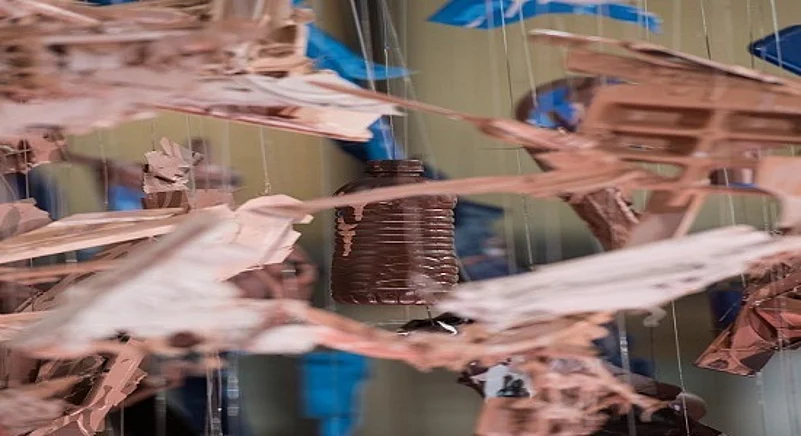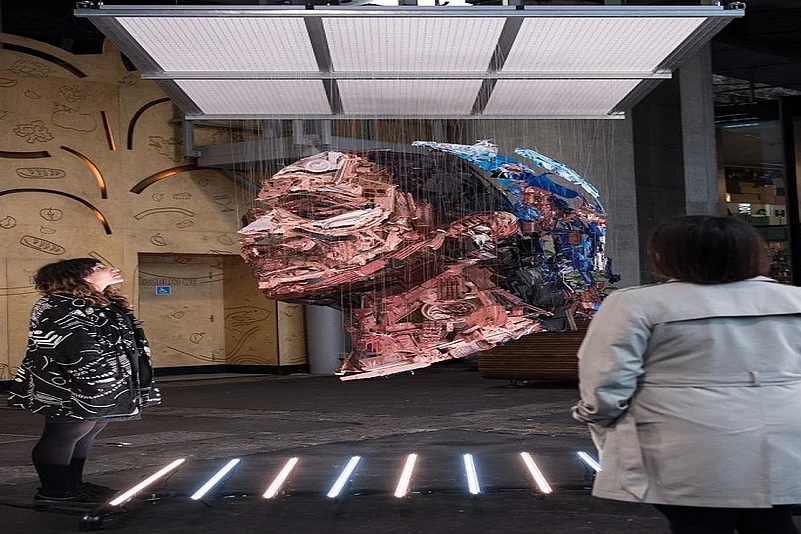Our planet is drowning in plastic. The devastating effect of plastic waste on our oceans is well known. However, there is a human element to the crisis, which is rarely discussed. Over three billion people live without formal waste management – that’s almost half the planet’s population. This has given rise to an informal waste picking economy. The Body Shop has launched its first Community Trade Recycled Plastic from Bengaluru, India. The initiative highlights the lesser-known, human side of the plastic crisis. By 2020 recycled plastic from India will go into the making of Body Shop’s haircare bottles.
The Body Shop wants to fight more than plastic pollution. It wants to drive social change and help empower people at the same time. To mark this launch, the company has unveiled a giant artwork of a female Indian waste picker in London’s Borough Market. Some of the world’s most marginalised people pick untreated waste to try to make a living. These waste pickers, many of them women, often live below the poverty line, work in appalling conditions and are shunned by society. Yet they form a critical line of defence in stopping plastic from entering our rivers and oceans.The Body Shop is launching its first Community Trade Recycled Plastic, in partnership with Plastics For Change. Community Trade is The Body Shop’s bespoke and independently-verified fair trade programme. Launching on World Fair Trade Day, this is a commitment to tackling the plastic crisis differently. Walking away from plastic altogether is not the answer. If used responsibly and given value, plastic can be sustainable. The Body Shop wants to use plastic recycling to help transform lives.
Advertisement
India alone has 1.5 million waste pickers who collect and sort over 6,000 tonnes of plastic every day that would otherwise pollute our rivers and oceans. The majority of India’s waste pickers are Dalits, previously known as ‘untouchables’. This means that they have virtually no visibility in society and have limited rights. They are vulnerable to discrimination, poor living and working conditions and an unpredictable payment system for the plastic they collect.
Shriti Malhotra, CEO, The Body Shop India says, “We recognize that the plastic waste crisis is a formidable environmental challenge, yet often ignore the fact that the waste picker community is unarguably, the human face of that crisis. Hasiru Dala, our local partner will work with the waste picker community directly. And we will support the waste pickers with a fair price for their labour and stable income, more sanitary working conditions, access to education, healthcare and financial services and the respect and recognition they deserve in society.”
Advertisement

Anamma, former waste picker and current Dry Waste Collection Centre Manager, Bengaluru says, “I have been picking waste for around 30 years, since I was a child. This is a really tough and physically demanding industry to be in. Waste pickers face all kinds of hardships, including harassment, late payments and health issues. However, through waste picking I have managed to raise a family and send my children to college. I am really proud of what I do. I believe we play a very important role in keeping cities clean and helping to recycle the huge amounts of plastic waste that society produces.”
With over three decades of working with disadvantaged communities around the world, The Body Shop is applying its expertise to help tackle the plastic crisis. An abundance of recyclable plastic already exists. In partnership with Plastics for Change, The Body Shop has started using community trade recycled plastic in its 250ml haircare bottles, including its bestselling Ginger Shampoo . The bottles will contain 100 per cent recycled plastic (excluding the bottle caps). Of that, 15 percent will be Community Trade recycled plastic, the remainder will be recycled plastic from European sources. The Body Shop will increase the amount of Community Trade Recycled plastic over time. Working with a start-up company and small waste picker communities means starting small and scaling up in a responsible and sustainable manner.
Advertisement
In its first year, The Body Shop will purchase 250 tonnes of Community Trade recycled plastic to use in nearly three million 250ml haircare bottles by the end of 2019. This marks the start of a wider ambition, which is to introduce Community Trade Recycled plastic across all PET plastic used by The Body Shop within three years. Over the course of three years the programme will scale up to purchasing over 900 tonnes of Community Trade Recycled Plastic and help empower up to 2,500 waste pickers in Bengaluru. They will receive a fair price for their work, a predictable income and access to better working conditions. They will also get help in accessing services such as education, financial loans and healthcare services, and the respect and recognition they deserve.
Advertisement
The Body Shop and Plastics for Change will work alongside local partners such as Hasiru Dala, a non-governmental organisation that fights for waste picker rights, and Hasiru Dala Innovations, a social enterprise dedicated to creating essential employment opportunities for waste pickers. Hasiru Dala is a social impact organisation that focuses on securing social justice for waste pickers. This is done collaboratively with the waste pickers, in the areas of: identity rights, access to family education, healthcare, housing and pension, skill development, market and employment access, and multi-tier policy advocacy. Hasiru Dala works with communities in Bengaluru, Mysuru,Chamrajnagar, Chikkamanguluru and Coorg districts and is an anchor member of the Alliance for Indian Wastepickers (AIW).
Advertisement
Hasiru Dala Innovations is a for-profit social enterprise that is focused on creating better livelihoods for waste pickers through inclusive businesses that have an environmental impact. It currently offers waste management and aggregation services to ensure equitable, fair pricing for waste pickers. The company leverages the entrepreneurship spirit of waste pickers and enables them to integrate into the mainstream economy with the ultimate goal of helping them become independent.
Lee Mann, Global Community Trade Manager for The Body Shop says, “As a company, we have always had the conviction to stand up for our principles when it comes to helping empower people, especially women, while protecting our planet. Our new partnership with Plastics for Change and our other partners will not only help support waste pickers but also champion plastic as a valuable renewable resource when used responsibly.”
Advertisement
Lee encourages Indian customers to participate in their in-store recycling scheme, BBOB (Bring Back Our Bottles). This encourages people to help the planet and return their empty bottles and this move is currently being executed at 15 stores in Delhi NCR and Bengaluru.
Andrew Almack, CEO of Plastics for Change says, “Plastic recycling is a major source of income for the one percent of the world’s most marginalised urban population and we are incredibly excited to partner with The Body Shop and other partners to help these groups get the financial and social benefits they deserve. This is the world’s first ever programme of verified Fair Trade plastic collection for use in recycling.”
Advertisement
Nalini Shekar, Co-Founder and Executive Director for Hasiru Dala says, “We set up Hasiru Dala and Hasiru Dala Innovations with the goal of giving waste pickers a formal identity in Bengaluru to enable them to fight for their rights and a fair place in society. Our new partnership with The Body Shop and Plastics for Change is another huge leap in recognising the relentless work our waste pickers carry out each day despite being faced with so many challenges.” Community Trade recycled plastic is just one part of the company's commitment to making its packaging more sustainable. The Body Shop is making recycling empty packaging easier and more accessible than ever before.
Advertisement
Initially available in five countries - UK, Australia, Canada, France and Germany - this partnership enables customers to return their empty bottles, jars, tubs, tubes and pots, in store, so TerraCycle® can recycle, where possible, in the local market environment. If recycling is not possible, TerraCycle® will repurpose the packaging into new consumer products such as benches or watering cans. The Body Shop aims to rapidly expand schemes like this within its global network and ensure every store has an in-store recycling solution2. Ultimately, the company plans to close the loop and re-use the plastic in packaging, or in shop fixtures.
Advertisement
Plastics For Change enables global brands and manufacturers to source high-quality recycled plastic from responsible supply chains. The company is verified by the World Fair Trade Organisation Organization. Its mobile platform and deal process provides waste pickers with access to fair and consistent income opportunities. It has developed an ethical sourcing platform to create sustainable livelihoods for the urban poor, while transitioning the industry towards a circular economy. Similar to fair trade agriculture, the platform creates transparency and accountability from the base of the supply chain to the store shelf. This results in more efficient shared-value chains and higher quality recycled plastic. It provides expertise to help catalyse brands and manufacturers to replace the use of new plastic with ethically-sourced recycled plastic, thereby immediately improving the social and environmental impact of its products and complying with Extended Producer Responsibility legislation.



















